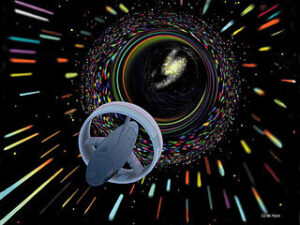This is Faith in Play #23: Kralc’s Law, for October 2019.
I don’t want to say that Arthur C. Clarke is famous for this; he is, after all, author of the book behind one of the most iconic of near-term science fiction space travel movies (have I limited that enough?), 2001: A Space Odyssey. However, he is quite frequently cited for one of his proposed “laws”, with sufficient prominence that it has become known as “Clarke’s Law”. It states
Any sufficiently advanced technology is indistinguishable from magic,
and a significant part of the point of the quote is to imply that magic never has to be the explanation for anything, because something we do not understand could well be technology beyond our knowledge.

I don’t know whether Clark believes in magic; I don’t know enough about the man. James “The Amazing” Randi is a devout disbeliever and debunker, yet I read a short story by him years ago (in Omni Magazine) in which the lead character, a stage magician, discovers that there is real magic in the world outside his knowledge, and so seeks to learn it. It is easy to assume that what we are watching has an entirely scientific explanation—what we would perhaps prejudicially call a “rational” or “logical” explanation.
However, the reverse is also true.
When I was creating the world Bah Ke’gehn for Multiverser: The Second Book of Worlds, I knew I was dealing with a universe in which our expectations were inverted. This was a world in which everything was done by magic, or sometimes psionics, and the youngest of the residents were taught magic in their basic lessons. Science and technology were feared—and frankly did not work well in that world. The attempted use or promulgation of technology or scientific ideas was heretical.
And in the midst of it I created a scholarly figure by the name of Ruthra C. Kralc, who proposed the law
Any sufficiently advanced magic is indistinguishable from technology.
Most of you will recognize that this is true without any examples, but as I was discussing this with my sons one of them raised the superhero character Deadpool. I’ve seen at least one of the movies, so I’m somewhat familiar with him (I’m afraid that comic books have been an outrageously expensive luxury for my budget since I was in middle school, and I generally prioritized getting musical equipment and amplifiers). I’m told that he can regenerate, that even if his body is reduced to dust it reforms into himself at a remarkable rate. We ventured to assert that this was not magic (although the ability was given to him by magic) but a body skill sufficiently advanced so as to be indistinguishable from magic—just as it was not magical when those tadpoles swimming in my pool in early June became frogs. A sufficiently advanced body skill is not distinguishable from magic, nor from sufficiently advanced technology.
It is one of the features of the Multiverser game that almost anything you can do can be done with science/technology, or with psionics/mental powers, or body skills, or with supernatural power—magic. Yet I think it is something we should bear in mind in life. Anything can be explained, but just because there is a plausible explanation that relies on science does not mean that that is necessarily the correct explanation. In an online forum game some time back I dropped one of my player characters, Graeme Comyn, into a world in which the magic of their past still worked but nobody believed in it anymore; Graeme had been in that world in the past, and learned not only how to use its magic but how to devise magic of his own. Recognizing the situation, he got a job as an associate of a popular stage magician and proceeded to create “tricks” that used real magic but were designed to look like there was a scientific illusion behind them. Since a magician never reveals his tricks, no one ever deduced that he was using real magic.
There is something reassuring to the secular mind to believe that “faith healing” is based on positive thinking, that there is a scientific basis for people to get well because they believe themselves into doing so. Yet that does not mean that there is no “magic,” no power of God, at work in that. A non-scientific explanation can be just as “logical” or “rational” as a scientific one, particularly since it might be correct.
The magic is there. We believe in magic. It’s not the explanation for everything we don’t understand—but then, science is not the answer for everything we don’t understand, either. Jesus did not heal and perform miracles and return to life by using some technology beyond our understanding, but by tapping supernatural power, the power of God, in a word, magic. The Apostles and other early believers performed miracles the same way. Kralc is right: just because there might be a scientific explanation for something does not make it the true explanation. The answer might be magic, even when an alternative explanation could be proposed.
So I encourage you to believe in magic.
Previous article: Individualism.
Next article: The Christian Veneer.
